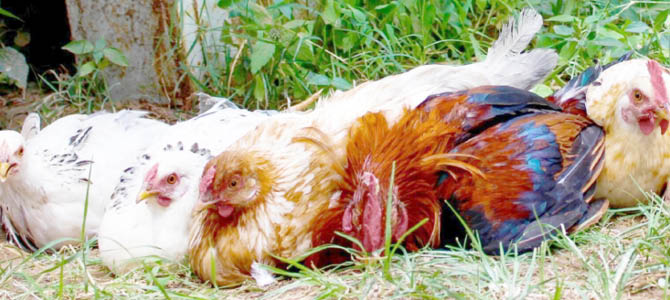Results of a new study strongly suggests that during evolution, the DNA of indigenous Ethiopian village chickens has changed to develop traits that can help the birds cope with the climatic challenges they face in their local environments.
Researchers found six key environmental drivers for adaptation: one connected with temperature, three connected to rainfall, which impacts water availability and two connected to soil or land cover which would impact food availability for foraging chickens.
- Amid soaring fertiliser prices, farmers to spend more on agrochemicals
- Address soaring fertiliser prices as national emergency
Multiple candidate genes associated with adaptation to these six specific environmental stresses in Ethiopian village chicken populations were also identified. This research will help develop future breeding programmes to improve the productivity and climate resilience of indigenous village chicken breeds.
Environmental Adaptation
The study, led by CTLGH researchers based at the Roslin Institute and the International Livestock Research Institute (ILRI) in Ethiopia, wanted to determine if the environment has influenced a change in the DNA of different groups of Ethiopian village chickens to help the birds cope better with the climates in which they live.
The group studied the DNA of indigenous chickens living in villages in different parts of Ethiopia and compared it with detailed climatic information for the areas in which the birds were being raised. This was the largest whole genome sequence data study for chickens from a single country and the first study to conduct such a comprehensive analysis of chicken environmental adaptation.
The researchers used data from 34 different agro-climatic variables recorded from the environment of 25 Ethiopian village chicken populations and carried out ecological niche modelling (ENM) to identify potential environmental drivers for genetic adaptation.
When the whole genomes of 245 indigenous village chickens were sequenced, multiple candidate genes associated with adaptation to these specific environmental stresses were identified. This strongly suggests that during evolution, the DNA of these indigenous chickens have changed to develop traits that can help them cope with the climatic challenges they face in their local environments.
“Ethiopia has a very wide range of climatic conditions and Ethiopian indigenous chicken breeds have an extensive genetic diversity that can be harnessed to help improve productivity and environmental resilience of poultry in the future,” said Dr Almas Gheyas, a CTLGH researcher from the Roslin Institute led the project.
Climate Resilient Poultry
As the population in Africa continues to rise, demand for livestock products like meat and eggs is set to increase. Climate change is also threatening the global livestock sector and is changing ecosystems, which affects the availability of water, quality and quantity of feed and forage and disease prevalence.
Sustainable improvement of poultry production to cater for increased demand will critically depend on our ability to utilise and develop climate-resilient birds.
Smallholder Tropical Poultry Farming
Backyard or smallholder poultry farming is important in Ethiopia, providing both food and income to poor rural households. 97 percent of Ethiopian poultry meat and eggs come from backyard farming of chickens. Importantly backyard poultry is often under the custody of women, providing them directly with income for the benefit of the entire household.
Village chicken populations are predominately indigenous breeds that are able to forage for food and are well adapted to the challenges of the environment in which they are raised.
Identifying the genetic basis of environmental adaptation will underpin future breeding programmes in low- and middle-income countries. These programmes will result in smallholder farmers being able to select specific chicken breeds that have the genetics required to thrive in a particular environment or climate.
“Combining genome analysis with Ecological Niche Modelling is a methodology that can be applied to different livestock species in a variety of environments and so utility is not just limited to chickens,” said Dr Jacqueline Smith, another CTLGH researcher based at Roslin Institute who was also involved in the study.

 Join Daily Trust WhatsApp Community For Quick Access To News and Happenings Around You.
Join Daily Trust WhatsApp Community For Quick Access To News and Happenings Around You.


